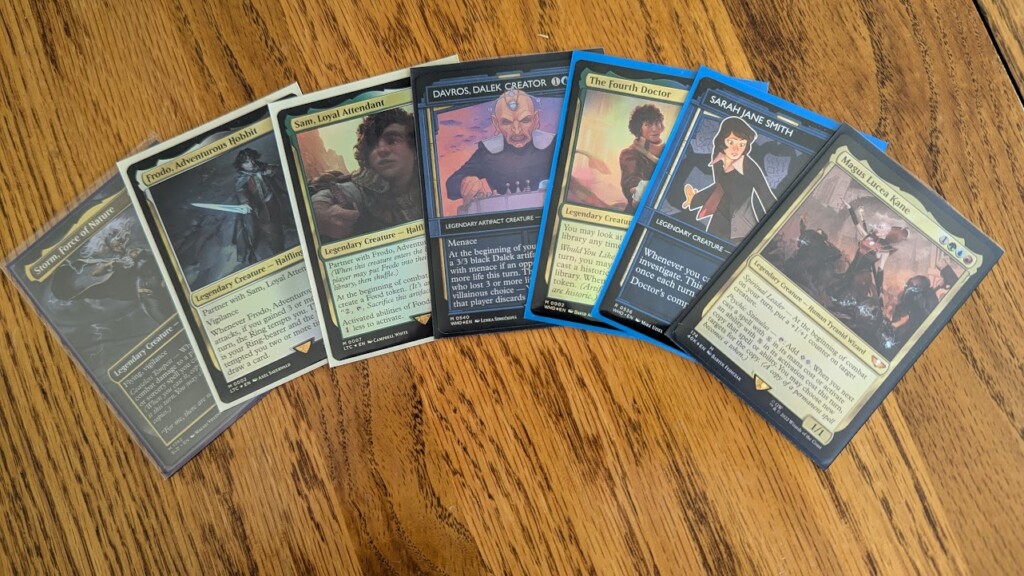In the fall of 2012, my eighth grade teacher told me he was going to change my life. It didn’t happen with any wisdom or perspective on the world, nor with any commentary on Romeo & Juliet. Instead, as we sat and ate our lunches, he taught me to play Magic: The Gathering, with his old collection from the 90s. Soon other friends and classmates joined in, and learning the game together was a great experience.
Since then, I’ve fallen in and out of playing Magic. I kept up with the game enough to hold a conversation with other players even when I didn’t play, and it’s been a nice skill to have in my back pocket when meeting new people. Since graduating college, I’ve made new friends through the game, and our weekly game nights have become a source of laughter and good times.
In the over ten years since I started playing, Magic has changed a lot, mostly for the better. Card design has improved, leading to better gameplay, and the release of Magic the Gathering: Arena for desktop and mobile has made it easy to play anywhere and anytime, not just at a local game shop (LGS) or when friends are free.
Of these changes, the biggest and perhaps most controversial is the adaptation of outside intellectual properties into the game. In September 2020, Wizards of the Coast, the company which publishes Magic, announced a direct-to-consumers product featuring characters from AMC’s The Walking Dead television show. (The direct-to-consumers model was itself still new and controversial within the playerbase, as many saw it as a way for WotC to cut out LGSs, where most people play Magic, put more money directly into their pocket.) The addition of selling cards which couldn’t be obtained any other way, in a limited quantity which would sell out, and weren’t set within any of Magic’s established world, provided another controversy which hasn’t died out in the years following.
Despite the divided playerbase, the product was extremely successful, and the following February WotC announced Universes Beyond, a product line which depicts stories from outside intellectual properties. These have been available in the aforementioned direct-to-consumers model, with properties like Stranger Things and Street Fighter, as well as via preconstructed decks built around Fallout, Doctor Who, and Warhammer 40,000, and even complete sets based around Lord of the Rings, Final Fantasy, and the upcoming Avatar: The Last Airbender and Marvel’s Spider Man expansions.
The Final Fantasy expansion, released in June, is currently the best-selling Magic set of all time. The set it beat out was also a Universes Beyond set, Lord of the Rings: Tales of Middle Earth. Despite the sales numbers, discussions of UB products tend to be more negative than positive. There are folks who have played for decades and don’t want to sit across the table from a card depicting a world they don’t recognize, feeling like this cheapens the brand and that Magic has “sold-out.” This forgets a simple fact: UB sets continue to sell well. Wizards of the Coast is owned by Hasbro, and the job of the company is to make money for investors. As long as UB sets sell, they will continue to be made.
I don’t dislike Universes Beyond. As Magic’s head designer Mark Rosewater often says on his blog, “Magic is a hungry beast.” The game has made expansions based on Greek mythology, gothic horror, the wild west, and now even space operas. Building partnerships with outside brands makes sense, and adapting outside IP to Magic has produced some really cool and interesting card designs, such as the weeping angel and psychic paper cards from the Doctor Who decks. The most fun I’ve had with deckbuilding was building around the card depicting the X-man Storm, as I tried to find in-universe cards which were close matches to the supporting cast of my favorite comic series. Best of all, people who previously saw Magic as having too high a barrier for entry are starting to play the game, as they see some of their favorite characters depicted as game pieces.
There are definitely problems with Universes Beyond. When Final Fantasy released, distributors sold out in record time, as both players and collectors tried to get their hands on the product. While I don’t care much for Final Fantasy, this concerns me for upcoming UB releases I might actually want to play with. Magic’s design team has resisted putting guns in their settings for a long time, even in their more technologically advanced settings, for fear that it would break the barrier of fantasy. They even went as far as to create magical not-guns for the wild-west themed expansion, best viewed in the art of this card, due to how integral shootouts are to the genre. All this work to exclude firearms makes the UB card Barret Wallace all the more weird, as the character is clearly in the middle of firing a weapon (though it’s also his arm? I know nothing about Final Fantasy).
At its core though, Universes Beyond is good for Magic. It pushes design into interesting spaces and gets more people playing the game. When a friend gets super excited about Miles Morales or Tom Bombadil getting cards even if I don’t like those IPs as much, it’s fun to talk about the characters and how they’re reflected in the game design. I’m never going to agree with everything WotC does. (In 2023 they sent the Pinkertons to an individual’s home because Amazon shipped the wrong product.) But through this game I get to have good times with friends, and if I get to have more good times with more friends because of Universes Beyond, it’s worth it.



